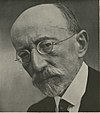B'nei Moshe
- Machine translation, like DeepL or Google Translate, is a useful starting point for translations, but translators must revise errors as necessary and confirm that the translation is accurate, rather than simply copy-pasting machine-translated text into the English Wikipedia.
- Do not translate text that appears unreliable or low-quality. If possible, verify the text with references provided in the foreign-language article.
- You must provide copyright attribution in the edit summary accompanying your translation by providing an interlanguage link to the source of your translation. A model attribution edit summary is
Content in this edit is translated from the existing Hebrew Wikipedia article at [[:he:בני משה (אגודה ציונית)]]; see its history for attribution. - You may also add the template
{{Translated|he|בני משה (אגודה ציונית)}}to the talk page. - For more guidance, see Wikipedia:Translation.


B'nei Moshe (Hebrew: בני משה, "Children of Moses", variously transliterated as Bnai Moshe, Benei Moshe, Bene Mosheh, etc.) was a Zionist organization. It was established as a secret organization in Odessa in 1889 on the day Seventh of Adar, which is considered the day of death and birth of Moses. While its originator was Yehoshua Barzillai (Eisenstadt), Ahad Ha'am was persuaded to take leadership of the organization. Its ideology was described as "cultural Zionism", as opposed to the political Zionism.[1][2]
In 1893 its headquarters were moved to Jaffa and it ceased to be secretive. It was suggested that it become a political party, however, internal controversies and frustration led to its disestablishment in 1897.[2]
Its membership was about 160 persons. Its major practical achievements include improvements in Hebrew education, in particular, establishing modernized heders (heder metukkan); helping in establishing the Rehovot settlement, and establishing a Hebrew publishing house Ahi'asaf in Warsaw, the first one of the kind.[2] It published the annual Ahi'asaf Tablet [he] (Hebrew: לוח אחיאסף) almanac (1893-1904) by a large group of writers and intellectuals, members of B'nei Moshe, from many different fields.[3][4]
Notable members
- Ahad Ha'am
- Avraham Freidenberg [he], lawyer, educator, Zionist activist, and literary editor, He headed B'nei Moshe in Kremenchuk after he was appointed "crown rabbi" there
- Avraham Moshe Bernstein, hazzan, choirmeister, composer, musicologist, writer. Member of B'nei Moshe since 1899. His music was popular in B'nei Moshe.[5]
- Ben-Avigdor [he] (Abraham Leib Shelkovich), writer, secretary of B'nei Moshe in Warsaw, pioneer of modern Hebrew publishing in Eastern Europe. In particular, he took part in the founding of Ahi'asaf
- Haim Margaliot-Kalvarisky [he], agronomist, land purchaser on behalf of the Jewish Colonization Association, secretary of B'nei Moshe in Jaffa
- Menachem Ussishkin
- Yehoshua Barzillai
- Yehuda Gur linguist, educator, writer, and translator. Together with Barzillai, he edited the B'nei Moshe monthly Mikhtavim me-Erez Yisrael ("Letters from Erez Israel", 1893–94).
References
- ^ Asael Abelman, "The Failure of Cultural Zionism", Mosaic Magazine, October 26 2016
- ^ a b c Benei Moshe, Jewish Virtual Library
- ^ Ahiasaf
- ^ שנה טובה למהלך החדש, Ha'aretz, September 28, 2011
- ^ AVRAHAM MOSHE BERNSTEIN











